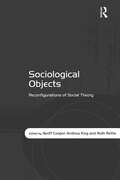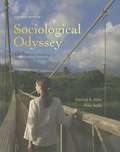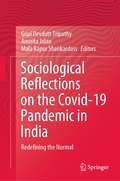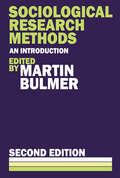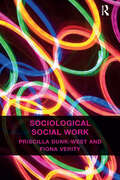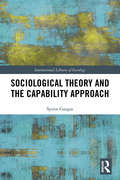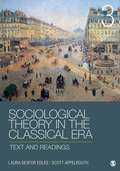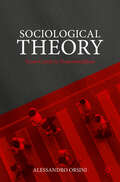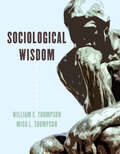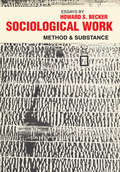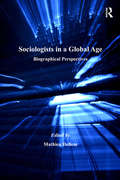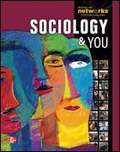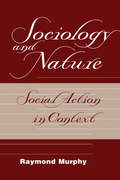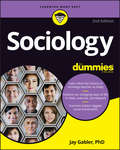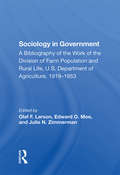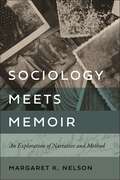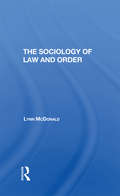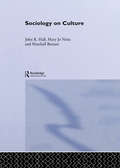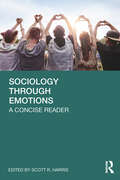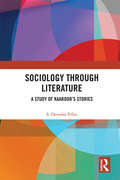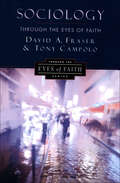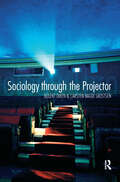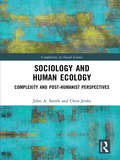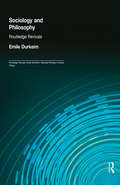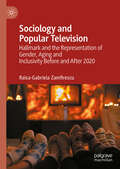- Table View
- List View
Sociological Objects: Reconfigurations of Social Theory
by Andrew King & Ruth RettieWhat are the aims of sociology? What are its objects of study? How relevant is the classical tradition to the practice of sociology today? This volume brings together internationally renowned and new scholars to consider the changing relationship between contemporary and classical sociology. Arguing that recent historical and theoretical developments make reconsideration timely, it suggests that whilst the classical tradition has a continuing pertinence, it is inevitably subject to ongoing reconfiguration. Assessing the explanatory value of classical and contemporary forms of sociology, interrogating social theory as both a form of explanation and a mode of practice, and considering the possible consequences for the discipline of questions about its subject matter, Sociological Objects steers a course between assertions about radical epistemological breaks on the one hand, and reverence for the classical tradition on the other. Rather, it emphasizes the value of reworking, reconsidering and reconfiguring sociological thought.
Sociological Odyssey: Contemporary Readings In Introductory Sociology (Fourth Edition)
by Patricia A. Adler Peter AdlerSOCIOLOGICAL ODYSSEY: CONTEMPORARY READINGS IN INTRODUCTORY SOCIOLOGY, Fourth Edition, helps bring sociology to life through a wide range of engaging, current articles, covering issues such as Internet dating, the black middle class, homosexuality, the straight edge movement, welfare recipients, and children's clique behavior.
Sociological Reflections on the Covid-19 Pandemic in India: Redefining the Normal
by Mala Kapur Shankardass Gopi Devdutt Tripathy Anurita JalanThis book presents a sociological study of the COVID-19 pandemic in the context of India. It invites readers to understand disasters and crises as triggers of radical transformations in society, changing the very nature of every day and the meaning of normal. It discusses the processes through which society accepts, internalizes and reinvents a new way of life. It provides insights into its impact on the individual, family, economy and the state and the relationships not only between them but also within them. The chapters draw attention to the concerns of the vulnerable sections of the population – the aged, children, women, the disabled, migrant labour and the economically backward classes. The chapters are written in an engaging style, and each chapter investigates the way societies think about the risk, threat and harm and the ways to navigate crises of all kinds. As such, the book provides a key read for academics, students and administrators, as well as general readers confronted by an existential crisis caused by the pandemic.
Sociological Research Methods: An Introduction
by Martin BulmerA rich source of ideas about sociological research methods to assist the researcher in determining what method will provide the most reliable and useful knowledge, how to choose between different methodologies, and what constitutes the most fruitful relationship between sociological theories and research methods.
Sociological Social Work
by Priscilla Dunk-West Fiona VeritySociological social work is a lifelong social work practice which is animated by a sociological perspective. Social workers 'shorthand' orientations such as 'strengths perspective', 'task centred' or 'humanistic' (to name but a few), as a way to identify their philosophical and theoretical approaches in professional life. Whilst some texts have examined sociology for social work, this text instead proposes that sociological social work is a legitimate and theoretically rich orientation, and this book demonstrates what sociological social work looks like in our rapidly changing world. This text will equip students and practitioners with a way to think sociologically, not just while they are studying, but as an ever present reference for making sense of social work purpose and how this is realised in a transforming world. This follows an established tradition in social work literature, but this book elevates and names the importance of this approach, which we argue is critically needed if social work is to achieve its agenda in transformative social, political economic and environmental contexts. The current landscape in which we live is one that is characterised by rapid changes which have implications for the life experiences of those with whom social workers work, social justice advocacy agendas, and for fulfilling the purpose of social work more generally. This book is essential reading for those looking to keep up with these changes.
Sociological Theory and the Capability Approach (International Library of Sociology)
by Spiros GangasSociological Theory and the Capability Approach connects normative strands of sociological theory to the fusion of ethics and economics proposed by Amartya Sen’s and Martha Nussbaum’s capability approach. Spanning classical (Hegel, Marx, Durkheim, Scheler, Weber) and contemporary debates (Parsons, Giddens, Luhmann) it identifies areas that bridge the current gap between sociology and capability approach. It thus builds on explanatory and normative concerns shared by both traditions. Engaging readers from sociology and capability approach, Spiros Gangas suggests that the proposed dialogue should be layered along the main areas of value theory, economy and society, extending this inquiry into the normative meaning attached to being human. To this end, the book reconstructs the notion of agency along the tracks of Nussbaum’s central human capabilities, considering also alienation and the sociology of emotions. It concludes by addressing the capability approach through the lens of social institutions before it takes up the challenge of ideological fundamentalism and how it can be effectively confronted by capability approach. This original book provides a fresh perspective on capability approach as it embeds it in the rich pool of sociological theory’s accomplishments. As an exercise in theoretical and normative convergence, it will be required reading for academics and students in social theory, cultural theory, philosophy and human development studies.
Sociological Theory in the Classical Era 3rd Edition
by Laura Desfor Edles Scott AppelrouthSociological Theory in the Classical Era introduces students to original major writings from sociology's key classical theorists. It also provides a thorough framework for understanding these challenging readings. For each theorist, the authors give a biographical sketch, discuss intellectual influences and core ideas, and offer contemporary examples and applications of those ideas. Introductions to every reading provide additional background on their structure and significance.
Sociological Theory: From Comte to Postcolonialism
by Alessandro OrsiniThis textbook analyses the work of classical and contemporary sociological theorists. The first part is dedicated to Comte, Spencer, Marx, Durkheim, Weber, Pareto, and Simmel. The second part covers the major contemporary sociological perspectives: Functionalism, Marxism, Conflict Theory, Symbolic Interactionism, Phenomenological Sociology, and Rational Choice Theory. The third part is devoted to Postmodern Theory, Feminist Theory, Postcolonial Theory, and Race Theory. The author combines academic rigour with clear and accessible language, offering students an in-depth and extensive overview of the main, recurring problems that have troubled sociological theory from its origins to the present day. The textbook uses contemporary examples, analysing how sociological theory can explain the most tragic phenomena of our time, including the war in Ukraine, the Israeli-Palestinian conflict, US-China competition over Taiwan, nuclear proliferation, radicalization, neofascism, white suprematism, jihadism, and terrorism. With pedagogic features aiding learning, this book helps navigate the various approaches, methods, and research that divide sociologists into distinct schools. This textbook is therefore an invaluable tool to any sociology student looking to gain a comprehensive understanding of the foundational thinkers that have shaped the discipline.
Sociological Wisdom
by William E. Thompson Mica L. ThompsonSociological Wisdom is based on applying the basic principles of sociology to the world around us. <P><P> Sociologists study patterns of behavior in order to draw general conclusions about a social issue that transcend the effect of the problem or issue on any particular individual. This is not to say that sociologists are unconcerned about individuals and their lives, but sociology’s emphasis is on the way individuals relate to others, people’s positions in society, and the interdependence between society and individuals. This text teaches students that it is more important than ever to study human behavior, social groups, and society utilizing critical thinking skills and careful analysis associated with sociological wisdom.
Sociological Work: Method and Substance
by Fanny GinorHoward S. Becker is a leading contemporary sociologist who interprets society as collective action and sociology, therefore, as the study of collective action. This volume explores the theory and methods necessary to study collective action and social interaction. Becker includes most of his work on theory and method that has not previously appeared in book form. It reflects his unique way of thinking about and studying society.The first part of the book treats methodological problems as problems of social interaction and lists a series of research problems requiring analytic attention. The second part illustrates Becker's approach through full reports on two of his major research projects. Four theoretical statements on how people change comprise the third part, and the fourth part includes important contributions to the study of deviance. These essays illustrate the need to study deviance as part of the general study of society, not as an isolated specialty.Sociological Work is an important statement of the distinctive theoretical and methodological views associated with the Chicago School of Sociology; it shows a deep concern with the first-hand study of processes and human consequences of collective action and interaction. This illuminating volume is an engaging introduction to some of the issues of importance to sociologists and those interested in the studies of collective action and deviance, and it is well adapted to use in courses in these areas.
Sociologists in a Global Age: Biographical Perspectives
by Mathieu DeflemSixteen leading international sociologists are brought together in this volume to share their experiences of becoming practitioners in the field. Selected for their comparative and transnational interests and experiences, the contributors include Martin Albrow, Karin Knorr Cetina, Diane E. Davis, Pierpaolo Donati, Leon Grunberg, Horst J. Helle, Eiko Ikegami, Tiankui Jing, Hyun-Chin Lim, Ewa Morawska, Richard Münch, Saskia Sassen, Joachim J. Savelsberg, Piotr Sztompka, Edward A. Tiryakian and Ruut Veenhoven. Each contributor provides an auto-biographical review of their journey into the discipline, with special attention paid to the intellectual and social-political contexts in which their work matured. Each chapter concludes with a commentary on the anticipated future direction of that particular sociological area. These original and reflective contributions provide fascinating and rare insights into the careers of sociologists living in a global age.
Sociology & You
by Jon M. Shepard Robert W. GreeneA sociology program written exclusively for high school students Sociology and You is written by successful authors with extensive experience in the field of sociology. Meet American Sociological Association standards for the teaching of sociology in high school with this comprehensive program.
Sociology And Nature: Social Action In Context
by Raymond MurphySociology as if nature did not matter has been the sociological expression of modern societies negligent of the processes of nature. In response to this ?ecological blindness,? Raymond Murphy examines the limitations of sociology that have resulted from this neglect.Humanity's success in manipulating nature destabilizes the natural support system of society on a planetary scale and, in turn, destabilizes all of society's institutions. Because the manipulation of nature has become so central to modern society, society, Murphy argues, can now be understood only in terms of the interaction between social action and the processes of nature. The growing awareness that social constructions unleash dynamic processes of nature?processes beyond human control that bear on social action?has the potential of radically transforming sociology. Sociology and Nature proposes the reconstruction of sociology in which nature does matters, developing a novel sociological approach that situates social action in its natural context.
Sociology For Dummies
by Jay GablerUnderstand how society works—and how to make it betterIt’s impossible to exist in the contemporary world without being aware that powerful social forces, ideas, and movements—#MeToo, climate change, and Black Lives Matter to name just a few—are having far-reaching impacts on how we think and live. But why are they happening? And what are their likely effects? The new edition of Sociology For Dummies gives you the tools to step back from your personal experience and study these questions objectively, testing the observable phenomena of the human world against established theories and making usable sense of the results.In a friendly, jargon-free style, sociologist and broadcaster Jay Gabler introduces you to sociology’s history and basic methods, and—once you have your sociological lens adjusted—makes it clear how to survey the big questions of culture, gender, ethnicity, religion, politics, and crime with new eyes. You’ll find everything you need to succeed in an introductory sociology class, as well as to apply sociological ideas to give you extra insight into your personal and professional life. Get a working knowledge of Sociology 101 Understand how human communities work Engage more deeply with debates on social justice, healthcare, and more Interpret and use sociological methods and research Whether you’re studying sociology at school or just want to gain deeper insight into our collective life, Sociology For Dummies gives you the tools to understand the mechanisms of the human world—and the knowledge to influence how they work for the better.
Sociology In Government: A Bibliography Of The Work Of The Division Of Farm Population And Rural Life, U.s. Department Of Agriculture, 1919-1953 (Rural Studies)
by Olaf F. Larson Julie N. Zimmerman Edward O. Moe Yvonne B. Oliver"This bibliography is the first major output of the project ""Sociology in the U.S. Department of Agriculture: the Galpin-Taylor years, 1 9 1 9- 1 95 3."" This project is being conducted under a cooperative agreement between the Agriculture and Rural Economy Division, Economic Research Service, U.S. Depa rtment of Agriculture and the Department of Rural Sociology, New York State College of Agriculture and Life Sciences at Cornell University. We are grateful to both organiza tions for providing funds. Financial support has also been provided by the Cornell University Agricultural Experiment Station and by a grant from the budget for the Rural Sociological Society's 50th Anniversary Committee. The Farm Foundation awarded funds to support meetings of an Advisory Panel of former key members of the staff of the Division of Farm Popu lation and Rural Life. The American Sociological Association, the Rural Sociological Society, and the Cornell University Agricultural Experiment Station provided funds to assist in covering publication costs. "
Sociology Meets Memoir: An Exploration of Narrative and Method
by Margaret K. NelsonHow sociologists can approach memoir in their writing, research, and in the classroomMemoirs attract millions of readers with their compelling life stories, vivid details, and often startling revelations. Beyond entertainment value, however, Margaret K. Nelson argues that memoirs hold potential as powerful resources for sociologists to engage with, analyze, and teach. Sociology Meets Memoir is a short and accessible guide to the significance of memoirs for the field of sociology, from their many possible uses to the numerous challenges they pose.This guide enables sociologists to learn about the different ways memoirs have been used as a medium through which to exercise and encourage the “sociological imagination.” Nelson offers clear definitions of the various and nuanced terms associated with memoir and examples of how different types of stories have been effectively integrated into scholarly research. Readers will gain an understanding of the immense power of memoirs as sociological resources, offering unique access to voices from the past as well as voices from the present which are traditionally marginalized. Nelson also focuses on the genre’s limitations and the difficult methodological questions that accompany their use in scholarly endeavors.Sociology Meets Memoir is a vital tool for all sociologists interested in this growing genre. By reading this guide, students and teachers alike will gain an understanding of how they might approach the current outpouring of memoirs and incorporate them into their teaching, learning, writing, and research.
Sociology Of Law & Order/h
by Lynn McdonaldThis book is about the law and order issue, and the role social scientists have played in legitimating it as a problem of grave social consequences. It is a study on rising crime rates and criminal behaviour within the limits of conventional social science, with its advantages and disadvantages.
Sociology On Culture
by John R. Hall Mary Jo Neitz Marshall BattaniCulture has become a touchstone of interdisciplinary conversation. For readers interested in sociology, the social sciences and the humanities, this book maps major classical and contemporary analyses and cultural controversies in relation to social processes, everyday life, and axes of ordering and difference - such as race, class and gender. Hall, Neitz, and Battani discuss: self and identity stratification the Other the cultural histories of modernity and postmodernity production of culture the problem of the audience action, social movements, and change. The authors advocate cultivating the sociological imagination by engaging myriad languages and perspectives of the social sciences and humanities, while cultivating cultural studies by developing the sociological imagination. Paying little respect to boundaries, and incorporating fascinating examples, this book draws on diverse intellectual perspectives and a variety of topics from various historical periods and regions of the world.
Sociology Through Emotions: A Concise Reader
by Scott R. HarrisOffering an accessible and intriguing look at emotions in society, Sociology Through Emotions collects together contemporary qualitative research that illuminates many of sociology’s central concepts and topics, from culture, socialization, and inequality to family, crime, healthcare, religion, and social movements.This book appeals to instructors who want to highlight the social factors that shape emotions as well as the impact of emotions on social life. It is an attractive supplement for courses on introduction to sociology, self and society, social psychology, and others focused on interaction, culture, and meaning making.
Sociology Through Literature: A Study of Kaaroor's Stories
by S. Devadas PillaiThis book presents a comprehensive study of nearly 100 of Kaaroor’s short stories. Kaaroor Neelakanta Pillai is one among the Big Six of the ‘new wave’ in Malayalam literature which began in the mid-1940s. The Big Six and their immediate followers wrote about the common man, peasants, pavement-dwellers, fishermen, rickshaw-pullers, underpaid school teachers — their lives, aspirations and vulnerabilities. By treating Kaaroor’s stories as case studies, the book takes a sociological approach to understanding the representation of a wide array of themes: romantic overtones, erotic pursuits, marital episodes, issues of family, lives of children, behavioural patterns, shades of greed, the idea of spirituality and politics in Malayalam literature. With its annotated transcreation and detailed commentary, this book brings Kaaroor’s works to the general reader, and will be useful to scholars and researchers of South Asian literature, English literature, linguistics, cultural studies, besides those interested in Malayalam literature and the Malayali/Indian diaspora across the world.
Sociology Through the Eyes of Faith (Through the Eyes of Faith)
by David A. Fraser Anthony CampoloColorfully written by two popular and respected sociologists, this volume shows how sociology has evolved, how it became divided from Christian faith, and how Christian sociologists can make sense of this branch of social science.
Sociology Through the Projector (International Library of Sociology)
by Bulent Diken Carsten Bagge LaustsenSociology through the Projector takes issue with the question of how contemporary film can help answering the general, abstract but still urgent question: what is the social today? This book explains the performative relation to contemporary social theory in which cinema functions as a tool for social diagnosis. There is much to be learned about social theory through an encounter with films as films are part and parcel of the society they portray. Increasingly more lay knowledge about social problems and facts stems from cinema as it offers to large audiences a popular and pedagogical introduction to social knowledge. Social theory cannot avoid a critical engagement with cinema as cinema interprets, invents, displaces and distorts the object of sociological inquiry. This book will provide a deeper understanding of contemporary social theory as the chosen films will work as a pedagogical route into contemporary social theory. The films represent a mix of European and American blockbusters and more aesthetically orientated films. The authors question several dominant topics and concerns within social theory and film studies. Firstly, by cross-examining a series of concepts such as identity, representation, memory and surveillance (filming social behaviour) which are of concern to both film theory and social theory. Secondly, by trying to develop imaginative approaches to standard social concerns such as exclusion, gender roles and inequalities, power, infantilisation and commodification of the social and psychological bonds. This book will be a great resource for students and researchers of Sociology, Contemporary Social Theory, Film Studies and Cultural Studies.
Sociology and Human Ecology: Complexity and Post-Humanist Perspectives (Complexity in Social Science)
by Chris Jenks John A SmithTraditionally, Sociology has identified its subject matter as a distinct set – social phenomena – that can be taken as quite different and largely disconnected from potentially relevant disciplines such as Psychology, Economics or Planetary Ecology. Within Sociology and Human Ecology, Smith and Jenks argue that this position is no longer sustainable. Indeed, exhorting the reader to confront human ecology and its relation to the physical and biological environments, Smith and Jenks suggest that the development of understanding with regards to the position occupied by the social requires, in turn, an extension of the component disciplines and methodologies of a ‘new’ human socio-ecology. Aiming to evoke critical change to the possibility, status and range of the social sciences whilst also offering essential grounding for inter-disciplinary engagement, Sociology and Human Ecology will appeal to postgraduate students and postdoctoral researchers interested in fields such as Social Theory, Socio-Biology and Ecological Economics.
Sociology and Philosophy (Routledge Revivals: Emile Durkheim: Selected Writings in Social Theory)
by Emile DurkheimFirst published in English in 1953, this volume represents a collection of three essays written by seminal sociologist and philsopher Emile Durkheim in which he puts forward the thesis that society is both a dynamic system and the seat of moral life. Each essay stands alone, but their connecting thread is the dialectic demonstration that a phenomenon, be a sociological or psychological one, is relatively independent of its matrix. The essays provide a valuable insight into Durkeheimian thought on sociological and philsophical matters and offer an excellent guide to Durkheim for students of both disciplines.
Sociology and Popular Television: Hallmark and the Representation of Gender, Aging and Inclusivity Before and After 2020
by Raisa-Gabriela ZamfirescuThis book examines representations of gender, age and identity across the Hallmark film and television output in relation to specific periods of time that pertain to changes within the specific entertainment sector. Using a comprehensive collection of 628 original Hallmark television films released between January 2015 and December 2023, the book applies content analysis to a variety of quantitative, qualitative, and mixed data, including behind-the-scenes credits, actors and actresses, characters and their narratives, promotional posters, Facebook comments, and official synopsis. In addition to examining diversity of race and religion, it analyses ageism through the portrayal of elders and young people in idealized imagery and stereotypes, inclusivity of LGBTQ and disabled characters, and ageism in relation to both masculinities and femininities. This book will be of interest to readers in fields including gender studies and sociology, visual communication, film and television studies, aging, media and communications, and popular culture.
